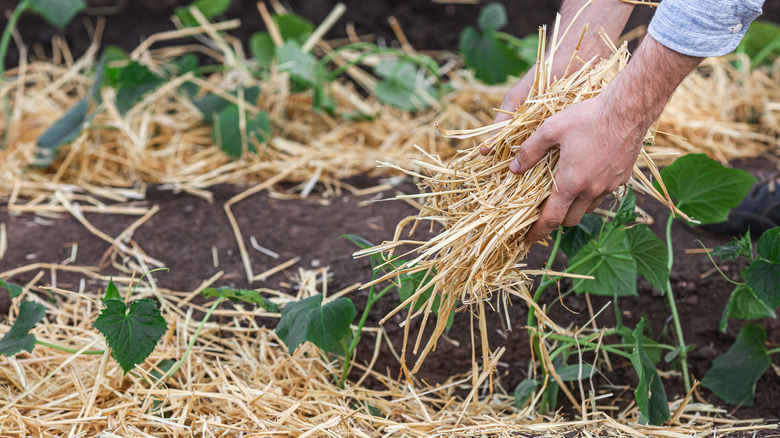Numerous types of mulch exist, though not all offer the same benefits to a garden. In a vegetable garden, mulch helps to add valuable organic nutrients to the soil as it breaks down while serving as a water retention tool. It can help keep weeds to a minimum and works well to protect a plant’s delicate roots from extreme temperature shifts. To choose the best mulch for your garden, consider the needs of the plants, as well as the ultimate benefits you hope to obtain from it.
The first decision to make relates to whether or not to use organic or inorganic materials. Typically, inorganic mulch, like manufactured items or stone, is beneficial for weed control, but they do not add any nutritional benefit to support your plants. Plastic versions may not be suitable for a garden in any way. Organic materials do more than just make the plants look pretty. You aren’t likely to need to remove them at any given time because the material will break down, decomposing into the soil to add valuable nutrients. Assuming your goal is to supplement the growth and health of your vegetable garden, focus on choosing organic mulches. From there, you have several varieties to select from, which you may wish to select to mulch your garden based on availability, cost, and overall function.
The best mulch for adding nutrients to the garden

Your initial goal in using mulch may be to help with water retention and weed control but think long-term. Some mulches are simply better for adding nutrient value to the soil, therefore minimizing your need to fertilize the soil down the road to support plant development. One inexpensive option for those in a wooded area is composted, crumbled, or shredded leaves. They do a good job of allowing water and oxygen to navigate to plant roots but are a solid source of nutrition as they break down. Though removing the remaining leaves in the spring before planting your new vegetables is best, most will break down well over the winter. Leaves and nearby twigs are great mulch options to support pollinators in your garden, too.
Also valuable are straw and hay-based mulches. This type of mulch is easy to install and offers good insulative quality throughout the year. Like leaves, it’s best to remove what’s left in the spring and replace it, and it’s a solid option for nutritional value. If you add mulch to your garden to overwinter bulbs, it’s best to use hay because it has a higher level of protective quality. However, when possible, avoid hay because it may have seeds, which could lead to unwanted plant growth in your space.
Using wood-based mulch in the garden
Any wood-based mulch can work well for most garden environments because it’s an organic product that will break down over time. It adds a good amount of nutrition to the soil, though it may take longer for that to happen than other types of mulch. Wood chips and bark mulches are also great choices for their ability to shield the root systems and minimize evaporation of moisture in the soil, and they work well over the winter to keep the ground warmer. The bigger pieces also discourage some pests from digging to find those bulbs and seeds during the winter and early spring.
Sawdust is another version of mulch. It’s less beneficial in terms of protective quality and better at adding nourishment to the soil itself. However, it easily allows for oxygen and water to move through it to penetrate into the root systems.
All types of wood-based mulch should be raked and removed or composted in the spring months and new put down to help remove potential bacteria growth. Also, when selecting these products, avoid any wood mulch that has had chemical applications, such as that will infiltrate into the soil and your plants. Specifically, avoid any mulch that’s not a natural wood color, especially those with red dye in them. Often, old pallets are used to make this type of mulch, which can put your garden at risk.